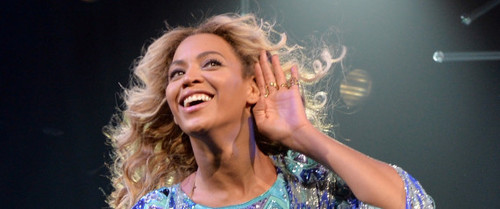And, on your right, ladies and gentlemen, are the graves of the careers Beyoncé slayed Thursday night.
This weekend, humanity was politely reminded that Queen B can do with the world whatever the fuck she wants. After Katy, Gaga, and Britney spent months and millions promoting their albums with disappointing sales, Bey dropped an iTunes exclusive, 14-track, 17-video album without warning and immediately became the number one best-seller in over 72 countries. That, dare I say, is the most punk move in pop music since the time I sang Sk8er Boi at my middle school graduation.
We cannot pretend to know what has been happening behind closed doors with the artist who is perhaps the most influential pop icon of our time. In my mind, there is a legion of people piecing together Beyoncé’s image, from immaculate hairstyles to inspiring attitudes, heart-breaking harmonies to soul-prodding belts. Beyonce’s brand is a machinery that pumped out $53 million this year, and with this eponymous album, Forbes magazine estimates that it could easily double this amount. Additionally, I don’t think anyone was emotionally prepared for a stunt of this proportion; the surprise album was a feat of true mastery over the public, an understanding of when and where the impact would be highest, and an ability to leverage Beysus’ incredible influence to take her a step further.
Beyoncé features popular themes from past albums. Of course, there are babymaking jams like Rocket, where she sings about dancing for her man, and how it means more than just the resulting Instagram picture. And certainly, there are empowering anthems like Pretty Hurts, where Beyoncé asks all the women who have changed their looks to appear more beautiful whether they are happy with themselves, asserting that it’s their “soul that needs the surgery.” Finally, there are some power ballads like the slightly-too-mysterious Heaven, a track with a lyrical twist rumored to be about Mrs. Carter’s miscarriage.
Beyoncé is a brave development for her as a musician as well. In addition to all the old flavors of her glory, we experience a new side of her in Haunted. On this track, we hear about the flipside of the Beyoncé machinery – music no longer feels like art, but a product. Talking about ‘the 9 to 5 just to stay alive,’ Ms. Carter’s ode to the working class lifestyle (and does she ever werq!) is the most experimental piece of the album. It is powerful, not in spite of but because of its spectral falsetto and minimal instrumentals – a true syncretic accomplishment, melding spoken word to ghostlike vocals.
A worthy mention is Queen B’s collaboration with Frank Ocean in Superpower. Frank’s sultry voice complements hers well in this duet, bringing to mind the image of two lovers exhausted after a devastating break-up – an image of two people standing in the same room amidst the ruins of a relationship that consumed them. Its lyrics do not say much, and perhaps that is a choice on the artists’ part to reinforce the idea of speechlessness in the wake of great loss. Even if contrived, they leave a strange-but-not-unpleasant aftertaste, sparking the hope that Frank and Beyoncé will make more art together one day.
More than anything, Beyoncé is an entrepreneurial decision. This choice makes me wonder whether Beyoncé herself is fully deserving of the ill nattering of trite platitudes with which we shower her. Her image has been artistically curated as much as it has been rationally engineered and, unfortunately, I cannot help but question her claims at authenticity (I don’t trust these recollectors / I’m torn). From these ideas comes the understanding that Beyoncé is a monolith of pop culture, always one step ahead of her colleagues, and a striking representation of what happens when talent and business sit down to make art. And once you make that reconciliation, you can just sit back and enjoy the slaying.

